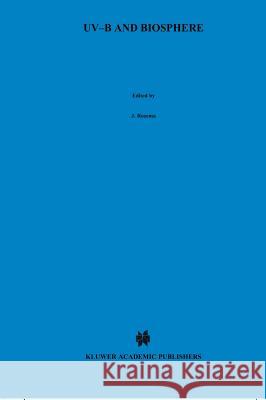Uv-B and Biosphere » książka
Uv-B and Biosphere
ISBN-13: 9780792344223 / Angielski / Twarda / 1997 / 313 str.
Current phase-out schedules of the production and emission of CFC's indicate that chlorine loading in the stratosphere is not yet at its maximum. The recovery of stratospheric ozone is estimated to take time and ele- vated levels of UV-B radiation are expected to occur throughout most of the next century. Despite numerous physiological studies of UV-B effects on plants, often grown in climate chambers, knowledge of UV-B effects on organisms and processes in natural aquatic or terrestrial ecosystems is poor. Currently it appears that UV-B radiation is not just an environmental stress' factor to plants. In various ways, which are incompletely understood, UV-B affects a wide range of physiological and ecological processes. Remarkably, recent field studies indicate that enhanced UV-B does not markedly affect photosynthesis, growth and primary production, but rather interferes with plant morphogenesis and plant and ecosystem functions relating to the secondary metabolism. This special issue and book UV-B and Biosphere is an attempt to cover this range and to report the progress made in the research of ecological effects of enhanced solar UV-B radiation. The papers in this book formed the basis of an international workshop entitled' UV-B and Biosphere', December 15-18, 1995, in Wageningen, The Netherlands. A first reaction of Hans de Boois on the number of papers and sessions scheduled from Friday to Sunday morning was: far too many.











